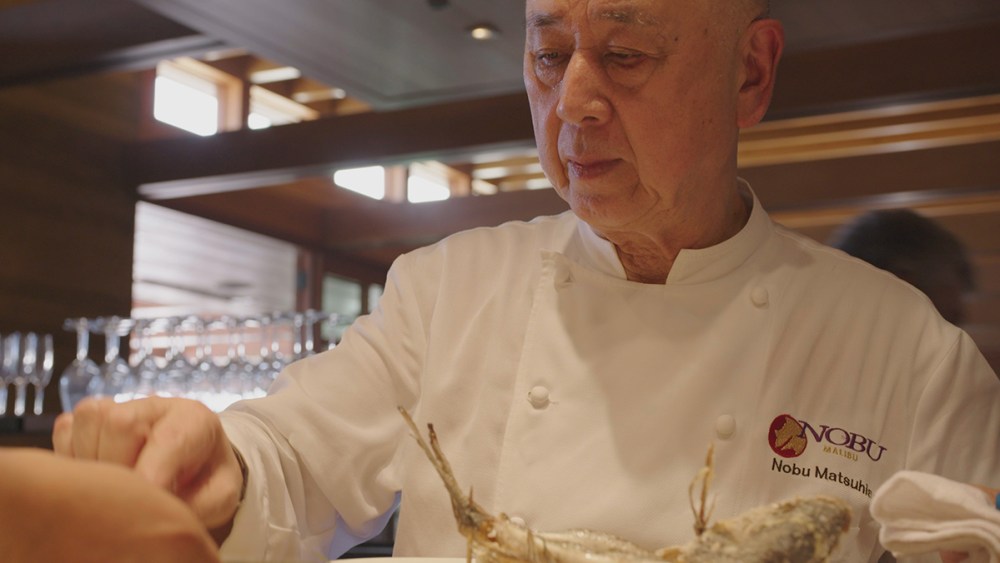Among the world’s most famous chefs, Nobu Matsuhisa makes for a wildly interesting cinematic subject — or at least, he would in a more accomplished film. From documentarian Matt Tyrnauer, “Nobu” lays out the factual bullet points of Matsuhisa’s early life in Japan, his fledging business in Peru, and eventually, his success in LA and New York City. However, the movie often brushes past what might have been its most intriguing moments in favor of an unobtrusive hagiography. It approaches dramatic rigor and visual intrigue in only the briefest of scenes, often far too late into its runtime.
The opening images of “Nobu” are enticing: mouth-watering extreme closeups of freshly prepared gourmet sushi and sashimi bathed in golden light, prepared by an expert hand. However, this is the first and last time the food in this food documentary feels like the central focus. There’s much talk about preparation, experimentation and the ways that Matsuhisa broke new ground, blending zesty Peruvian ingredients with otherwise rigid Japanese cuisine. As several food critics note, the world-renowned chef does not do fusion. However, there are only so many repeated shots of cilantro being carefully laid on sliced yellowtail one can stomach before the idea starts to feel rote. Perhaps the movie could’ve fused few more sources of inspiration.
For a film about a chef so revolutionary, “Nobu” is often bland and traditional. It relies on familiar talking-head interviews and the occasional archival footage in order to paint its Wikipedia portrait of a culinary legend. And while its interviewees are occasionally family members, they’re just as often stakeholders in the global Nobu franchise, including actor Robert De Niro. The movie spends so much time inside fancy boardrooms, and on footage of luxurious new Nobu restaurants and high-end hotels that it leaves little time for Matsuhisa himself and the struggles he’s endured. At one point, he mentions having contemplated suicide, but the film moves on from this subject within seconds.
The further “Nobu” goes on, the more it becomes a highlight reel of the most opulent locations in the restaurateur’s portfolio, with experiences sure to be out of most viewers’ reach. Beyond a point, it plays like a sprawling timeline graphic of company history, something one might expect to see at a flagship McDonald’s. Its bare-bones, standardized approach feels too inorganic, and too conveyor-belt-processed, to meld with Matsuhisa’s culinary style, or his outlook on his art — which the movie also frequently brushes past. It isn’t until Matsuhisa is seen catching up with fellow celebrity chef Wolfgang Puck that the movie briefly features an enticing conversation on the two figureheads’ philosophies on food, but this also barely lasts.
Matsuhisa is seen to be fluent in Japanese, English and Spanish in the film, and his travels appear to take him through challenging learning experiences, but these are often reduced to fleeting recollections supported by one old photograph per location. “Nobu” affords little focus to how its subject’s travels informed his hybrid worldview, or his ceaseless, granular drive for perfection, to the point of driving his subordinates mad. There’s likely a good movie somewhere on the cutting room floor, since these ideas make brief appearances, but that they’re seldom explored speaks to a film whose roughest edges have been sanded down.
Matsuhisa is flesh and blood, and tragic events revealed late in the runtime might make you wish you got to know him better. However, these misfortunes circle back to ideas that the movie had long ago brushed past already. In theory, following any of these threads might open up intimate issues of professional lifestyle and mental health, which have long plagued the high-stress gourmet restaurant industry — and have seemingly affected Matsuhisa too. But “Nobu” is a film whose most lucid conclusion is that its titular restaurant is worth your hard-earned cash. So, anytime it approaches a challenging topic, it treats emotional investment as a piping hot stove, instinctively backs away and pours cold water all over any promise of feeling something real.
Read the full article here


